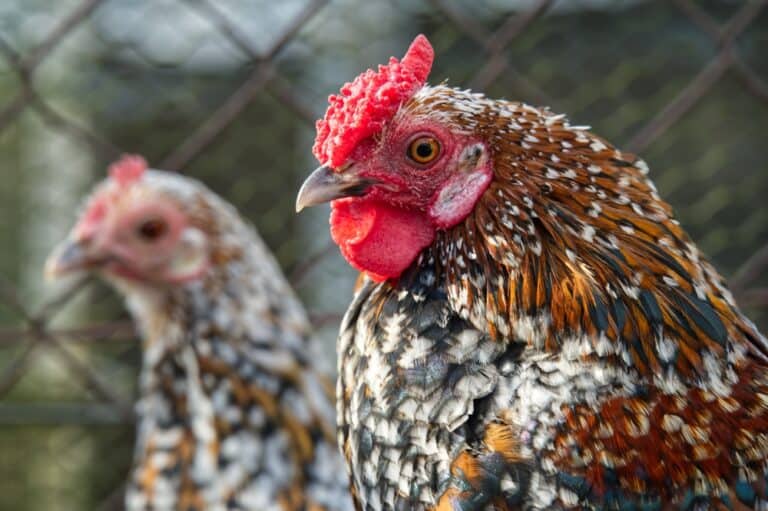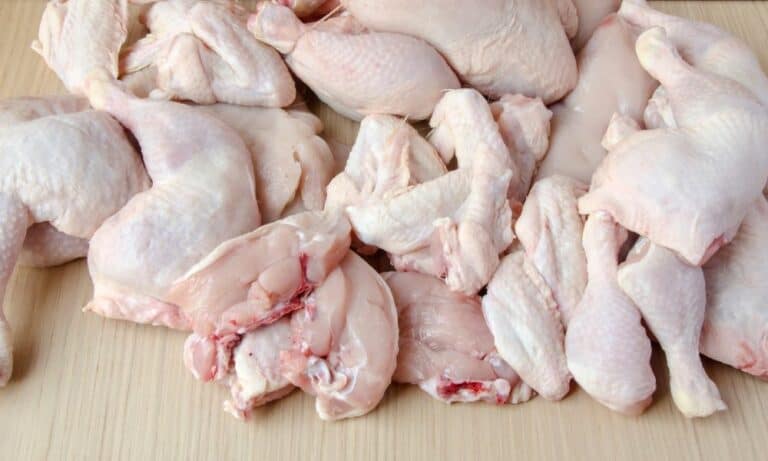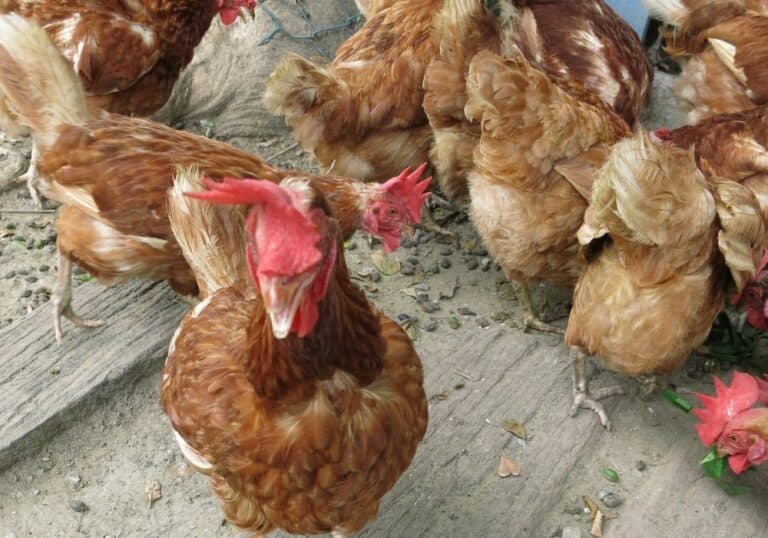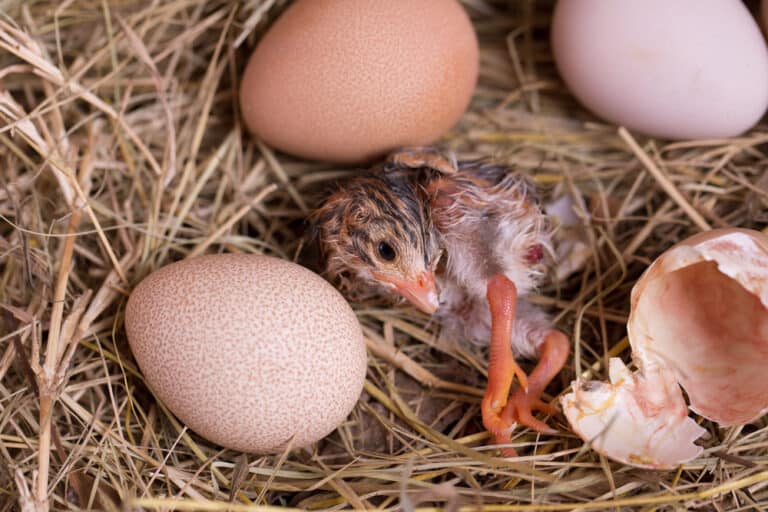Have you ever thought about your rooster’s life expectancy?
Most times, roosters or cockerels are raised primarily for meat production. As a result, they only live for 6 to 10 weeks of age, especially in commercial chicken farms.
However, if we eliminate our constant need for white meat, these proud and noisy birds can live for 5 to 8 years on average.
Here, we will uncover the secrets behind their longevity and highlight the factors that influence their life expectancy.
So, if you’re a first-time chicken owner or simply curious about the lifespan of this fascinating creature, you have stopped at the right page.
Keep on reading and discover how long roosters can raise the quality of your chicken flock and provide you companionship.
General Overview of Roosters
With a distinctive comb, a bright wattle, vibrant plumage, and intimidating spurs, a rooster is an integral part of the chicken hierarchy or pecking order.
The cockerel keeps the balance in the flock, breaking up hen fights, encouraging egg laying, and monitoring nesting boxes.
Besides that, roosters serve as protectors. These birds guard the hens, young pullets, and chicks against aerial and ground predators by sounding the alarm whenever they spot a predator. A cock will also keep the rest of the flock together in the coop and fight against an attacker.
Furthermore, you need roosters to hatch baby chicks. While hens can lay eggs without roosters, the eggs will never hatch.
A cockerel must fertilize the egg during mating so it can develop into a chick. For this reason, roosters offer farmers a free and economical way to increase the number of their backyard chickens.
Here’s the best part:
Beyond their striking appearance, male chickens have a lot of personality. Most people find roosters entertaining and interesting and keep them around as pets.
Let’s not forget the rooster’s crow. While some individuals see it as a problem, some love it because the crow serves as a mother’s nature alarm and a sign of new day dawning.
Based on this information, it’s easy to understand why you might be interested in understanding their life expectancy.
Average Lifespan of Roosters
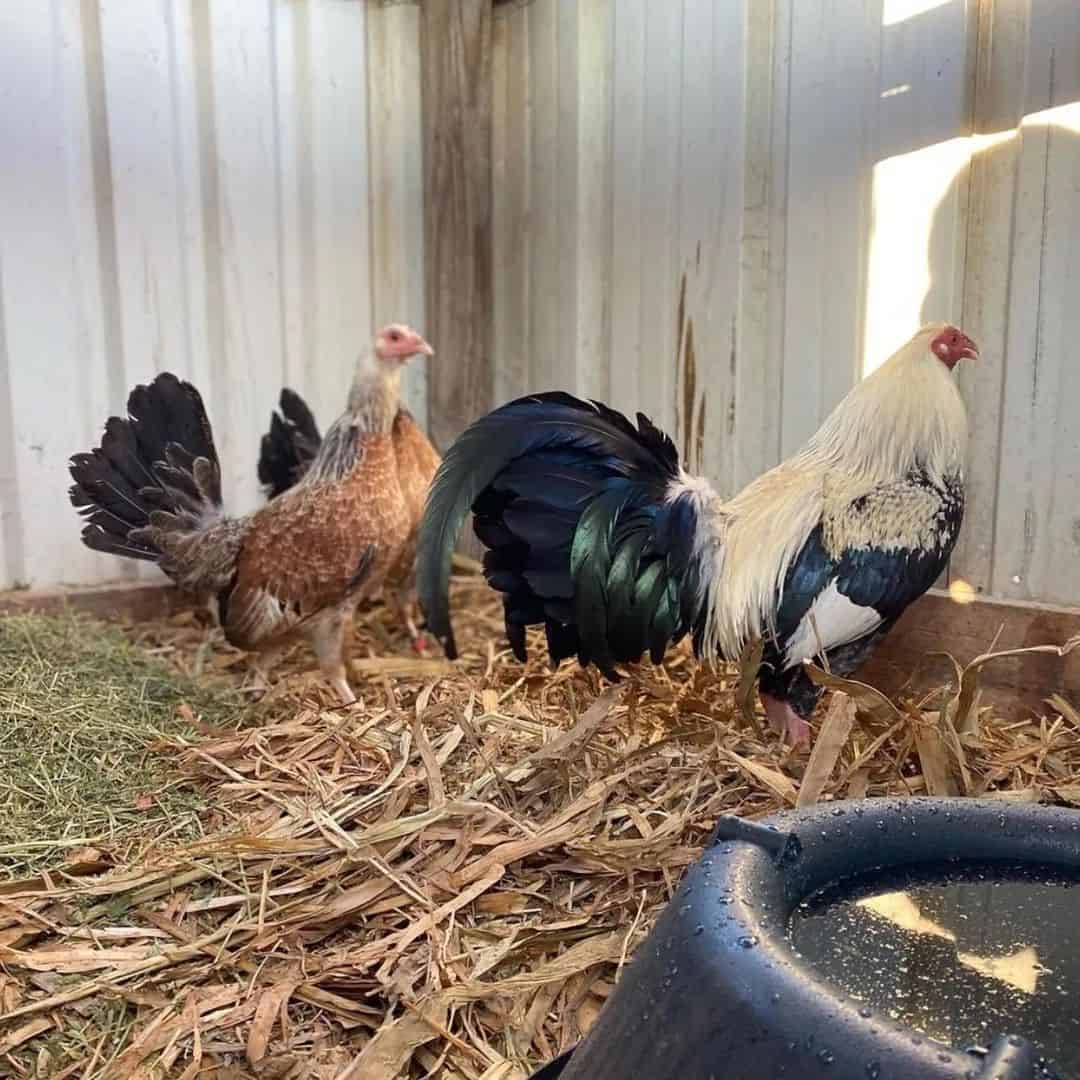
In commercial settings, roosters are hatched, raised, and harvested over one year. While this might seem inhumane, it’s the only way for chicken keepers to meet the growing demand for meat.
However, male chickens raised on backyard farms can have a longer lifespan, usually ranging from 5 to 10 years. The reason is, their owner sees more value in them than just meat production.
As stated above, when roosters reach sexual maturity, they help farmers increase their flock size by mating and fertilizing eggs.
What’s more, roosters enjoy a comfortable and safe living environment, medication, and nutritious food in backyard farms. As a result, these birds can live for several years.
While we can’t provide you with the exact age roosters can reach, there have been exceptional cases where hens and cockerels have surpassed the 10-year mark.
Do Roosters or Hens Live Longer?
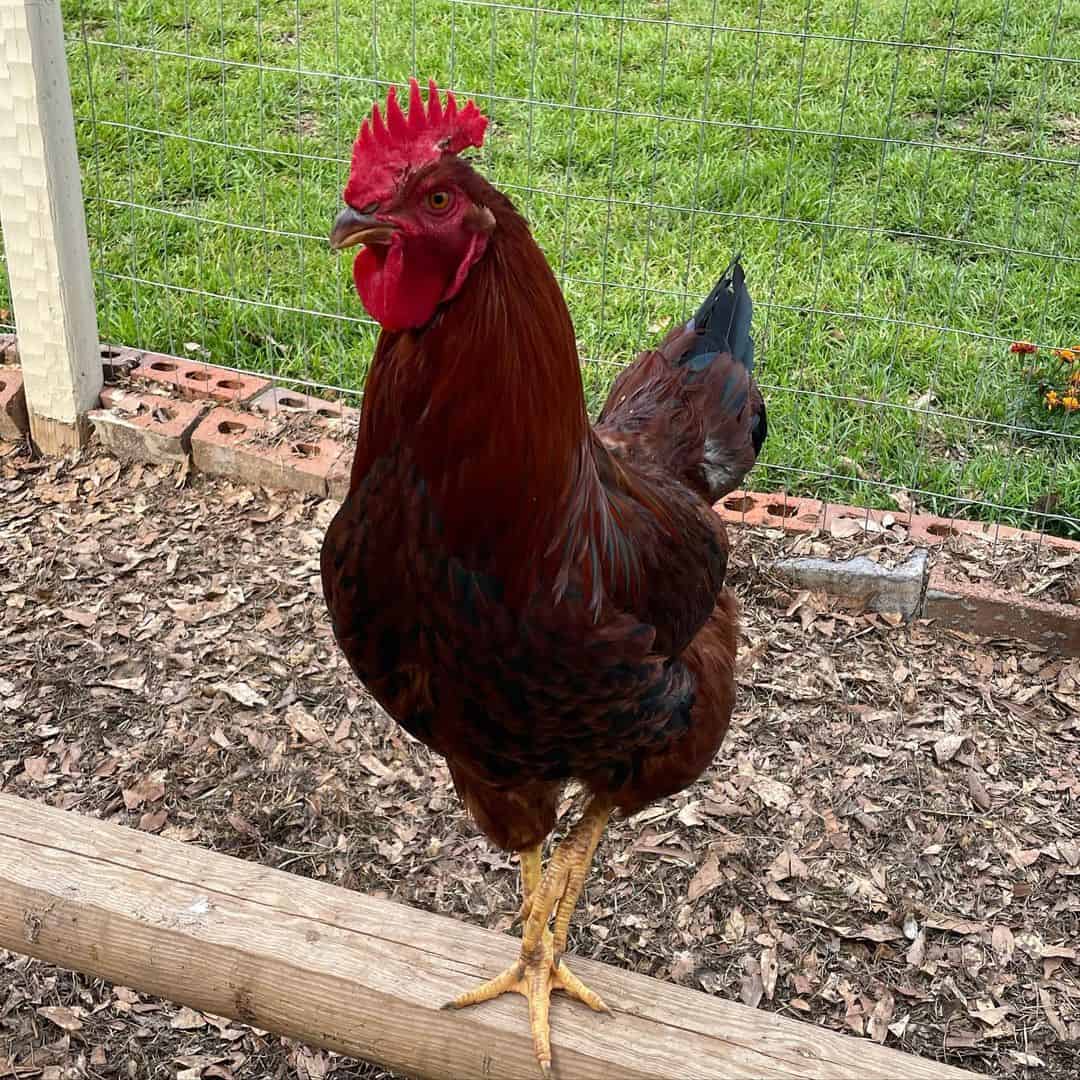
Hens have a longer life expectancy than roosters because they lay eggs and are often peaceful. So, poultry owners are happy to let them live as pet chickens until they die of natural causes.
Moreover, hens can co-exist with other members of the flock. The same cannot be said for roosters because they tend to fight other males in the group to establish dominance.
Sometimes, their fights could lead to serious injuries or death. Therefore, owners might prefer to butcher or sell additional cockerels in the flock to reduce fights.
Additionally, the males are under constant pressure to protect their pressure harem of egg layers from other male chickens and predators. In the worst-case scenarios, they might sacrifice themselves to save their flock.
Since roosters have vibrant or flashy plumage, they make an easy target for predators. This, coupled with the need to protect, reduces the lifespan of roosters significantly.
The World’s Oldest Chicken
It’s believed Bob Ross, the fortune teller, a blind white-crested Polish show rooster, lived to be 20 years. Although the owner, Antony of Alabama, claimed Ross was the world’s oldest chicken, Bob never received the Guinness World Record.
Bob passed away in 2010, and Antony buried him in the “Wood of Wonder” near his drive-through art installation.
The title of the world’s oldest chicken goes to Muffy, a Red Quill Muffed American hen owned by Todd McWilliams. Muffy died in 2011 at the age of 22 years.
The oldest living chicken is Peanut, a hen from Michigan, USA. After surviving an encounter with death over two decades ago, the hen was approximately 20 years old.
But make things a bit more interesting. Have you ever heard the story of Mike, the headless chicken from Colorado?
As the name suggests, Mike lived for 18 months without a head. Yes! It’s possible.
As it happens, the chicken owner, Lloyd Olsen, missed Mike’s jugular vein, an ear, and some part of his brain as he was chopping his head.
Like most freshly terminated chickens, Mike staggered around without a head. But he was determined to survive the traumatic experience. In fact, he began pecking for food and even preening his feathers, like chickens with their heads
Seeing this determination, Lloyd decided to let the rooster live. He began feeding him a mixture of crushed chicken feed and milk using a dropper.
Surprisingly, Mike grew from 2.5 pounds to nearly 8 pounds by the time of his death. But before that, he toured the country with his owner, helping him to make money.
Lloyd charged people who wanted to see Mike 25 cents, and he earned at least $4,500 per month. Before he died in Phoenix, Mike was valued at $10,000.
If you ask us, this is arguably the best Guinness World Record.
Factors That Impact a Rooster’s Lifespan

Several factors can influence the lifespan of roosters, including:
1. Predators
Who do you think is the number one predator of roosters?
If humans were the first thing that came to your mind, you’re right. Although we raise chickens, we tend to slaughter them to meet our desire for tasty meat.
If that’s not enough, some people force roosters to fight in cockfighting events. Luckily, these competitions are illegal in many countries.
After humans, dogs top the chart for eating cockerels. Across the world, there’s no shortage of stray dogs willing to break into your chicken coop and eat your flock.
Also, we have so many irresponsible dog owners who care less if their furry friends pose a threat to their neighbor’s flock.
That’s where a dog fence comes in. Install a dog-proof fence around the chicken coop to protect your precious birds from canine intruders. Additionally, you can install an electric fence to deter dogs and other predators, like bobcats, snakes, raccoons, foxes, skunks, and coyotes.
2. Diseases
Roosters are susceptible to a variety of illnesses and health issues. Perhaps the most common diseases that affect male chickens include:
- Infectious Bronchitis – When infected with avian coronavirus, chicken can develop infection bronchitis. The disease is characterized by depression, dehydration, and rapid breathing.
- Coccidiosis – Caused by a protozoan parasite, Coccidiosis affects your bird’s digestive system, leading to diarrhea and weight loss. The disease also causes stunted growth and sometimes death because of malnutrition.
- Avian Influenza– Also known as bird flu, AI is a respiratory disease that’s hard to manage because it spreads quickly. Roosters with this disease usually sneeze a lot and produce nasal discharge. If not treated immediately, Avian Influenza causes death.
- Bumblefoot–Bumblefoot is an infection inside the chicken’s foot caused by bacteria. Clinical symptoms of this disease include swelling, redness, and the formation of scabs. Other times, the bacteria cause lameness.
3. Environmental Conditions
Sure, roosters can withstand a variety of weather conditions. But in extremely cold places, they might require protection from the low temperatures to prevent frostbites. This explains why it’s rare to find chickens in Antarctica.
Roosters don’t do well in hot climates since they might overheat unless you provide them with shade. Hot temperatures also increase the chickens’ susceptibility to heat stress and heat-related diseases that can cause death.
4. Genetics
As for genetics, the breed of a rooster can determine its lifespan. If the rooster is from parents with a long life expectancy, there’s a chance the bird will have a long and healthy life.
Most commercial roosters are hybrids developed with meat production in mind. These genetic modifications prioritize faster growth and high-quality meet over long-term health benefits.
As a result, hybrid roosters have a shorter life span compared to heritage breeds that come from pure stock.
Tips to Extend a Rooster’s Lifespan

For centuries, roosters have been an integral part of our culture. They are not only a source of meat but also a source of companionship because of their social and docile natures.
If you want your pet to provide you companionship and excitement for several years, follow the tips below:
1. Provide Proper Diet and Nutrition
A well-balanced diet comprising proteins, minerals, and vitamins provides your roosters with energy and strength, plus lowers stress levels. As a result, your bird can resist disease, battle unfavorable weather conditions, and live up to a ripe old age.
A healthy feed for roosters consists of grains, vegetables, fruits, mealworms, and occasional treats that help them meet their dietary needs.
Before we forget, remember to provide them with adequate clean water. Like humans, roosters cannot survive without water. This essential resource helps in temperature regulation, digestion, and waste removal.
So, install several automatic chicken waterers in the coop to ensure your chickens have constant access to water.
2. Maintain Proper Housing Conditions
Ensure the chicken coop is predator-proof, well-ventilated, and spacious. Clean and disinfect the coop regularly to prevent the spread of viruses, bacteria, and other pathogens that can cause diseases.
Regular cleaning also removes bothersome odor from accumulated dropping and waste from chickens. Additionally, it eliminates pests like mites, lice, flies, and rodents, which can spread diseases.
Aside from that, weatherize your chicken’s house. As mentioned earlier, roosters are prone to extreme temperatures. By weatherizing the coop, the birds can stay warm during cold winter months and cool during hot summer days.
3. Regular Checkups
Regular checkup involves observing your cockerels for signs of injury, stress, and abnormal behaviors. If you notice any something out of the ordinary, consider contacting a veterinarian. Luckily, local veterinary doctors address poultry problems, unlike in the past.
Schedule routine vaccinations and preventive treatments to protect your roosters from common infections. Also, address any health concerns promptly before they become severe and cause death.
4. Predator Protection
Make your roosters’ environment safe by implementing measures to shield them from predators. Install an electric fence and lockable doors to deter coyotes, foxes, and raccoons from entering the coop and eating your chicken.
Introduce motion-activated lights and alarms to discourage predator activities. These tools make wild animals feel uneasy because they think humans are watching them.
Another way to protect your roosters is to cover food sources and potential gaps in your coop that predators might use to gain access. You can also introduce a guardian animal, like a German Shepherd to guard your birds throughout the night.
5. Stress Reduction Techniques
Limit stressors, like overcrowding, sudden changes in diet, and loud sounds if you want your roosters to stay healthy. Stress usually increases a bird’s cortisone levels, reducing its ability to heal from injuries and diseases.
To create a stress-free environment for your male chickens, provide them enough space to roam, forage, and exercise. It also helps to provide them with perches or toys to stimulate their minds.
6. Select Breeds That Live the Longest
Lastly, choose a heritage breed with a longer lifespan, including.
Final Thoughts
Roosters live for an average of 5 to 10 years. But some male chickens can surpass the 10-year mark, with some living up to 20 years.
However, the lifespan of roosters varies significantly based on several factors, like nutrition, predators, genetics, and diseases.
By understanding these factors, you can implement effective care practices, like minimizing stressors and regular checkups, to increase your bird’s survival rate.
That’s all for today. If you have any queries, tell us in the comment section.

